UK cold weather persists with sub-zero nights to come
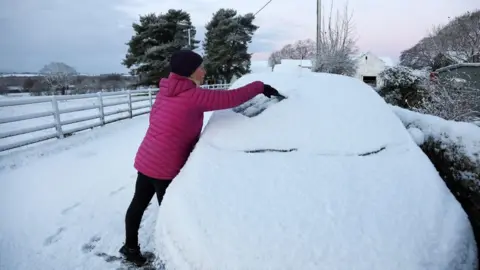 David Forster/Alamy Live News
David Forster/Alamy Live NewsMore bitterly cold nights are on the way for much of the UK, with temperatures falling well below zero.
Overnight temperatures dipped to a frosty -6.6C (21F) in the Suffolk village of Santon Downham, and most places saw readings as low as -2C to -5C.
The coldest night is forecast on Friday when temperatures could drop to -9C.
Large swathes of the UK are under yellow weather warnings for snow and ice, making travel disruption likely.
Nearly the whole east coast of Britain has a Met Office warning in place until 11:00 GMT on Friday. Another covers much of south-west England until 16:00 GMT on Thursday.
A warning just for ice is in place in the east of Northern Ireland.
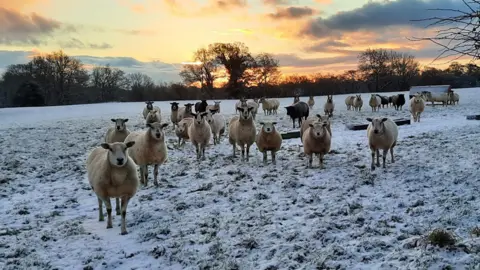 Ali Lamb / BBC Weather Watchers
Ali Lamb / BBC Weather Watchers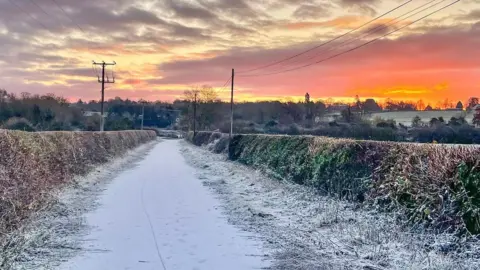 BBC Weather Watchers/David E
BBC Weather Watchers/David E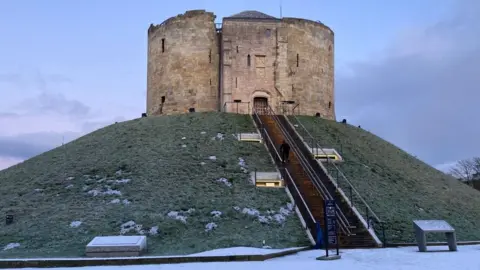 BBC Weather Watchers
BBC Weather Watchers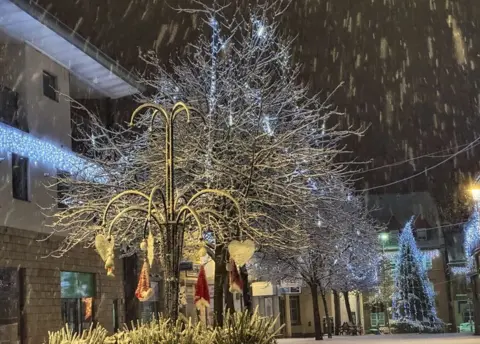 BBC Weather Watchers / Lyz Scarr
BBC Weather Watchers / Lyz ScarrOn Thursday, wintry showers are moving in across eastern parts of the UK which has led to icy conditions and snow for some.
In Aviemore in the Scottish Highlands, there is 5cm (2ins) of snow. The Grampians, North York Moors and parts of the Pennines could see another 2 to 5cm fall through the day.
Further south, there has been rain, sleet and some snow, which is likely to settle over Dartmoor with between 5 and 10cm possible.
The snowfall created dramatic scenery across many parts of England.
People across parts of the UK had their coldest November night since 2010 overnight into Wednesday. In low-lying Prestwick, in Ayrshire, the overnight temperature fell to -5.5C (22F) and dropped to a chilly -6.1C (21F) in the Cumbrian town of Keswick.
Overnight into Thursday, there were also lows of -6.1C (21F) in Oxfordshire village of Benson, -5.4C (22F) in the Cairnwell area of the Highlands, and -3.1C (26F) in Castlederg, County Tyrone.
Typically, November temperatures are 6C to 10C, making this spell particularly unseasonal.
And it is expected to continue for several more days at least, with daytime temperatures between 1 and 6C but some areas not getting above freezing all day.
The coming nights will be the coldest with temperatures later on Thursday widely falling below freezing soon after sunset and dropping down to -3 to -6C overnight.
British Gas said it had seen a surge in demand for engineer callouts and expected more than 40,000 to take place in the coming days. It said people could avoid issues by doing things like insulating their pipes and regularly bleeding radiators.
For motorists, there are a number of precautions which can be taken while driving in cold weather conditions.
These include allowing extra time to de-ice vehicles before setting off on a journey, planning trips along major roads that are more likely to be gritted, and bringing provisions in case of becoming stuck in the snow or ice.
Driving in a higher gear, or in 'winter' or 'snow' mode in an automatic, also allows for greater control of a vehicle.
Responding to the most recent cold snap, an AA spokesman said its research showed a majority of motorists would choose to drive even with an amber warning in place, and said "common sense precautions" should be taken.
The Local Government Association, which represents councils in England and Wales, said its members were "ready to work around the clock to grit roads and pavements" and had stockpiled "millions of tonnes of salt". It encouraged people to check on elderly neighbours.
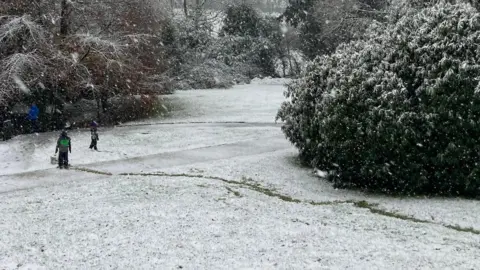 BBC Weather Watchers/Surfer Si
BBC Weather Watchers/Surfer Si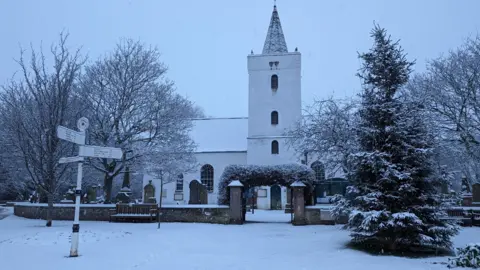 Muddy-Paws / BBC Weather Watchers
Muddy-Paws / BBC Weather WatchersThe cold November weather is being felt well beyond the UK, with much of Europe also shivering with cold air from the Arctic.
Denmark's capital city, Copenhagen, recorded its lowest November temperature in 104 years this week with -7.7C (18F).
In the Alps, ski resorts are welcoming heavy snowfall ahead of the winter season.
Over the next five days, the Austrian Alps could see another 1.5m (5ft) of fresh show.

Find out the weather forecast for your area, with an hourly breakdown and a 14-day lookahead, by downloading the BBC Weather app: Apple - Android - Amazon
The BBC Weather app is only available to download in the UK.

